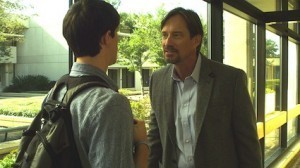C. Aaron Russell's Blog, page 7
March 27, 2014
Time For Obama To Speak Out For Religious Freedom in Saudi Arabia
By Todd Daniels (Persecution.org)
 03/25/2014 Washington D.C. (International Christian Concern) – Is promoting religious freedom abroad a priority in President Obama’s foreign policy? A few members of Congress certainly think it should be. On Thursday, the President will be getting a letter from more than 50 representatives urging him to publicly address human rights and religious freedom during his upcoming visit to Saudi Arabia.
03/25/2014 Washington D.C. (International Christian Concern) – Is promoting religious freedom abroad a priority in President Obama’s foreign policy? A few members of Congress certainly think it should be. On Thursday, the President will be getting a letter from more than 50 representatives urging him to publicly address human rights and religious freedom during his upcoming visit to Saudi Arabia.
In a pre-release copy of the letter obtained by International Christian Concern, members of congress ask the president to specifically address several human rights issues, including the “major concern” of religious freedom. The letter also calls on the president to take the bold step of addressing these issues publicly, saying “If your administration has previously raised such concerns through private channels, the Government of Saudi Arabia’s grave human rights record reveals its willingness to ignore such advice.”
On Friday, President Obama is scheduled to meet with King Abdullah in Riyadh to address a number of important security issues in the region. The Kingdom of Saudi Arabia is a leader among Islamic countries, a close ally of the United States, but also one of the most restrictive countries in the world with respect to fundamental human rights and religious freedoms. As a friend and ally, President Obama should urge King Abdullah, and the other officials he meets with, to respect those values that America claims to represent, values which President Obama himself has recently praised.
“Yet even as our faith sustains us, it’s also clear that around the world, freedom of religion is under threat,” President Obama said at the National Prayer Breakfast on February 6, 2014. “We see governments engaging in discrimination and violence against the faithful. We sometimes see religion twisted in an attempt to justify hatred and persecution against other people just because of who they are, or how they pray, or who they love,” he continued. This statement is profoundly true about the Kingdom of Saudi Arabia.
“Freedom of Religion is Neither Recognized nor Protected under the Law”
As the most recent report on International Religious Freedom from the Department of State describes, “Freedom of religion is neither recognized nor protected under the law and the government severely restricted it in practice.” In January, the Pew Forum on Religion and Public Life listed Saudi Arabia as the fourth most restrictive nation on earth in terms of government regulations on religion. In essence, unless you are a member of the Sunni Islamic majority, you legally have no right whatsoever to practice your faith in Saudi Arabia. According to the 2013 report from the United States Commission on International Religious Freedom (USCIRF), “Not a single church or other non-Muslim house of worship exists in the country.” The impact of these policies that restrict freedom of expression, freedom of gathering, and freedom of worship, affect not just the more than 20 million Saudi nationals, but also some 7.5 million foreign workers, many of whom are non-Muslims.
The congressional letter to the president coming out on Thursday also mentions incidents of Christian persecution, including an incident in December of 2011 when Saudi secret police raided a gathering of 35 Ethiopian workers who were meeting in a private home to pray together. Over the following eight months, ICC worked with numerous members of Congress on this case to advocate for their release. Finally, on August 1, 2012, these 35 workers were deported back to Ethiopia. “The Saudi officials don’t tolerate any other religions other than Islam. They consider non-Muslims as unbelievers. They are full of hatred towards non-Muslims,” one of the prisoners told ICC following his release.
Unfortunately, this was not an isolated incident. Foreign workers are regularly detained for similar charges, and in some cases the punishments can be far more severe. In May, 2013, a Lebanese national was sentenced to six years in prison and 600 lashes for assisting a Saudi woman in fleeing the country, after she converted to Christianity. A Saudi national was sentenced to two years and two hundred lashes for his role in her escape, Fox News reported.
These incidents represent just a small percentage of the incidents of religious persecution that have been documented in recent years. While the Kingdom of Saudi Arabia is one of the most repressive regimes in regards to religious freedom and human rights, they are also a key ally of the United States. As a result of this relationship, President Obama has an opportunity to address these abuses.
“Promoting Religious Freedom is a Key Objective”
President Obama, in his remarks at the National Prayer Breakfast, continued, “As I’ve said before, there are times when we work with governments that don’t always meet our highest standards, but they’re working with us on core interests such as the security of the American people. At the same time, we also deeply believe that it’s in our interest, even with our partners, sometimes with our friends, to stand up for universal human rights. So promoting religious freedom is a key objective of U.S. foreign policy. And I’m proud that no nation on Earth does more to stand up for the freedom of religion around the world than the United States of America.
This trip presents the President with a prime opportunity to put his own words into action. Saudi Arabia is a government that works with the United States on core interests, and also one that shows little respect for universal human rights, chief among them religious freedom. So today, ICC is joining with over 50 members of congress in urging the President to promote religious freedom as a part of his discussions with King Abdullah. This Friday is a very rare opportunity to change the lives of millions of foreign workers and Saudi nationals for the better; we call on President Obama to publicly take full advantage of it.
ICC (International Christian Concern) @ www.persecution.org. ICC is a Washington D.C.-based human rights organization that exists to help persecuted Christians worldwide. ICC provides Awareness, Advocacy, and Assistance to the worldwide persecuted Church. For additional information or for an interview, contact ICC at 800-422-5441.
March 24, 2014
Bold and endearing story drives moviegoers to God’s Not Dead
In our modern society where Christian stories are generally watered down or riddled with inaccuracies in an attempt to be politically correct and appeal to larger audiences, God’s Not Dead displays an unapologetic Christian viewpoint through relatable characters that audiences can identify with. This film could have easily been ripped from the headlines, as public schools and government institutions attempt to hide God from public view, preferring to confine Him behind closed doors of the church, until some national tragedy warrants calling on Him generically (not by the name Jesus) for a brief time until the media can move on to the next news story.
God’s Not Dead is a typical case of discrimination and prejudice against Christians in America. A nation that was founded on freedom of religion is becoming anything but. The plot follows a university student to class, where he encounters an atheist philosophy professor, not just content to remain in his own non-belief, but determined to impose his own cynical views against religion on all students that take his class. The Christian student is forced into a dilemma, take the easy way out and compromise his beliefs by denying God publicly, or stand up for his religious rights.
 What’s unique about this story is that it not only gives our typical Western example of religious discrimination, but also gives us a sneak peak of what Christians from other cultures face, such as those converting from Islam and Communist China, albeit not nearly the full wrath of what they could be subjected to in their own nations.
What’s unique about this story is that it not only gives our typical Western example of religious discrimination, but also gives us a sneak peak of what Christians from other cultures face, such as those converting from Islam and Communist China, albeit not nearly the full wrath of what they could be subjected to in their own nations.
The boldness and freshness of the story has resonated with under appreciated and underestimated Christian audiences, as indicated in the movies very strong weekend debut, even though it had a fraction of the advertisement budget and was shown on very few screens compared with its Hollywood big budget competitors. If you appreciate faith-filled entertainment and are looking for an uplifting performance that will recharge your spiritual batteries, go see this one.
C. Aaron Russell—Christian writer, speaker and missionary at Men of Mind. Author of newly released book, Lessons In Faith—learned the hard way.
March 20, 2014
The rise and fall of an empire: Could history repeat itself in the west?
FrontPage Magazine via (Raymondibrahim.com)
By Bruce Thornton
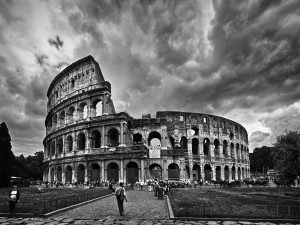 For three centuries the West built up enormous economic, cultural, and military capital that dwarfs and dominates that of the rest of the world. Other countries may hate and resent Europe and the United States, but they still have to imitate, adapt, or steal the technology, financial systems, and even popular culture of the West. Yet this dominance has come at a price for Westerners, one that contains the seeds of our decline.
For three centuries the West built up enormous economic, cultural, and military capital that dwarfs and dominates that of the rest of the world. Other countries may hate and resent Europe and the United States, but they still have to imitate, adapt, or steal the technology, financial systems, and even popular culture of the West. Yet this dominance has come at a price for Westerners, one that contains the seeds of our decline.
One baleful effect of this achievement has been the erosion of the virtues and ideals that created Western dominance in the first place, a phenomenon long recognized as the cost of national success. Two thousand years ago the Roman historian Livy, surveying the wreckage of the Roman Republic, invited his reader to contemplate the “life and manners” of his ancestors that led to their dominance, and “then, as discipline gradually declined, let him follow in his thoughts their morals, at first as slightly giving way, next how they sunk more and more, then began to fall headlong, until he reaches the present times, when we can neither endure our vices, nor their remedies.” Livy specifically linked this decline to the vast increase of wealth that followed the success of Rome, and that “introduced avarice, and a longing for excessive pleasures, amidst luxury and a passion for ruining ourselves and destroying every thing else.”
Clichés, one might say, but no less true for that. The astonishing wealth of the West, more widely distributed than in any other civilization, the abandonment of religion as the foundation of morals and virtues, the transformation of political freedom into self-centered license, and the commodification of hedonism that makes available to everyman luxuries and behaviors once reserved for a tiny elite, have made self-indulgence and the present more important than self-sacrifice and the future. Declining birthrates, a preference for spending on social welfare transfers rather than on defense, and a willingness to beggar our children and grandchildren with debt in order to finance these entitlements– all bespeak a people whose wealth deludes them into thinking that they can imprudently ignore the future and indefinitely afford these luxuries that in fact insidiously weaken the foundations of our social and political order. This process is more advanced in Europe than in the U.S., but we in America have been steadily moving towards the same mentality.
Yet we Westerners have a vice peculiar to ourselves–thinking the rest of the world is just like us and wants what we want because we are the destination towards which historical progress is inexorably moving. Because the rest of the world does imitate us in certain respects, desires our technologies, even enjoys our popular culture, we think that they have the same attitudes we have toward religion, or social relations, or violence, or the supremacy of ideals like peace, tolerance, cooperation, openness, equality and the like. This arrogant assumption lies behind the whole edifice of international law, and the diplomatic processes and institutions that administer it, that we think can provide global order, peace, and prosperity.
But any law must rest on a consensus about what behaviors are acceptable, or what ideals are more important than others. Given the great global variety of belief about these issues, such a consensus that accepts Western notions as the norm is difficult, if not impossible to genuinely achieve. Lip service is indeed paid to the Western consensus, particularly by the global elites with whom our own elites are familiar, but that is a result of Western economic and military dominance. Behind the soothing talk of human rights, peace, and the diplomatic resolution of conflict, across the globe very different aims and beliefs continue to drive behavior that clashes with our own aims and beliefs. Yet blinded by our arrogant assumption that we are the vanguard of the future, we ignore those values and beliefs that contradict our own, or patronizingly explain them away as the consequence of ignorance, superstition, poverty, or the machinations of malignant elites and psychopathic dictators.
Survey foreign policy just in the years after 9/11, and we see the dangerous consequences of our narcissism. The whole “war on terror” has, under both parties, been compromised by the failure to understand historical Islam in its own terms, particularly its doctrine of violent jihad against the infidel. Numerous passages from the Koran, Hadith, and Islamic jurisprudence for 14 centuries have made explicit this religious imperative. During that same time, Europeans victimized by the invasions, raiding, occupations, and slaving justified by this doctrine understood that these depredations expressed the violent intolerance at the heart of Islam. Alexis de Tocqueville in 1838 wrote, “Jihad, Holy war, is an obligation for all believers … The state of war is the natural state with regard to infidels … The violent tendencies of the Koran are so striking that I cannot understand how any man with good sense could miss them.” Sixty years later Winston Churchill wrote of the Taliban’s ancestors, “But the Mahommedan religion increases, instead of lessening, the fury of intolerance. It was originally propagated by the sword, and ever since, its votaries have been subject, above the people of all other creeds, to this form of madness.” Surveying the global conflicts waged by Muslims, Churchill concluded, “The forces of progress clash with those of reaction. The religion of blood and war is face to face with that of peace.”
This consensus about Islam, the bitter fruit of 14 centuries of aggression and listening to what Islamic doctrine clearly says, today arrogant Westerners dismiss as the fruit of racism, intolerance, and imperialism. Assured of our superior knowledge and morality, we presume to explain to millions of Muslims that they don’t understand their own religion. Just recently CIA chief John Brennan, as Raymond Ibrahim reported, told the Council of Foreign Relations that al-Qaeda’s ideology is “a perverse and very corrupt interpretation of the Qur’an,” and that “al-Qaeda has hijacked” Islam and “really distorted the teachings of Muhammad.” But mysteriously, Brennan continues, despite this presumed heretical misreading of Islam, “that ideology, that agenda of al-Qaeda has gained resonance and following in many parts of the world.” Whether it is the terrorist attacks on 9/11, the misunderstanding of the “Arab Spring,” the Palestinian Arab genocidal hatred of Israel, or the danger of Iran’s acquisition of nuclear weapons, this distortion of Islam has hampered our response to aggression and indulged our delusion that a majority of Muslims want peace, prosperity, and freedom more than they want to obey Allah and live by Islamic precepts. Having reduced our faith to a life-style choice and comforting holiday traditions, we Westerners cannot imagine a religion whose believers take its commands seriously, and see the world as the arena of a long spiritual struggle they are destined to win.
Then there’s the fatuous response to Vladimir Putin’s aggression against Ukraine and the Crimea. Since many of us fancy ourselves internationalists and cosmopolitans too sophisticated for passionate national loyalty, we discount the powerful pull of ethnic and national identity. Believing in the international order as a sign of the human race’s progress and improvement, we sneer at Putin’s pursuit of national interests by violence as “19th century” and contrary to Russia’s true interests, as though we know those better than the Russians do. Meanwhile what we should be doing is calculating whether Putin is going to achieve his aims at the expense of our own interests and security. With similar arrogance, since we are hostile to the power of faith in people’s lives, we brush away Putin’s analysis of a hedonistic, heathenish West as insincere propaganda, forgetting that many Russians have not followed us in our disregard for religion as an archaic superstition. No doubt, those ethnic and religious motives are intermingled with more mercenary and chauvinistic ones, but that messy complexity of human behavior, the ability of people simultaneously to pursue two conflicting or mutually exclusive goods, is precisely what our Western consensus about the progress of human nature ignores. Hence we are vulnerable to the ruthless and the fanatic, since in every conflict we prefer to bring a diplomat to a gunfight.
So here we are, still living off that enormous capital amassed by our ancestors, and doing nothing to restore it. But those cultural and moral resources are dwindling by the day, and outside the West brutal rivals are watching and waiting, exploiting our arrogant delusions and manipulating our bankrupt ideals like “diplomatic engagement” in order to achieve their aims. Meanwhile, like Livy’s Romans, we “can neither endure our vices, nor their remedies.”
About Bruce Thornton—Bruce Thornton is a Shillman Journalism Fellow at the Freedom Center, a Research Fellow at Stanford’s Hoover Institution, and a Professor of Classics and Humanities at the California State University. He is the author of nine books and numerous essays on classical culture and its influence on Western Civilization.
March 18, 2014
Prioritizing viewpoints of politics and faith
Our faith is inherently suspect of all political ideologies — conservatism included
By Pascal-Emmanuel Gobry (The Week Magazine)
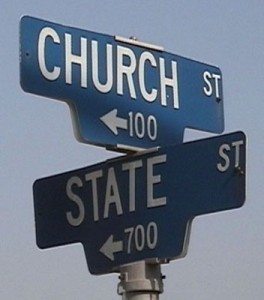
Many liberals have long suggested that it’s impossible to be a Christian and a conservative, because the love of the poor preached by Jesus Christ is incompatible with the economic and social policies promoted by conservatives. Christian conservatives, obviously, disagree. They would say that, at least on economic and social policy, Christian liberals and Christian conservatives agree about the ends — policy that promotes the common good with a preferential option for the poor — but disagree about the means. Jesus told us to love the poor. That is not at all the same thing as voting for programs that take money from one group of people to give it to another, whatever the merits.
As a Christian and a conservative, obviously I think that’s true.
But that’s not where the story ends. It’s where it starts.
To most non-Christians — and to many Christians — Christianity is primarily a set of doctrines. But for 2,000 years, Christianity has understood itself to be fundamentally an encounter with a specificperson: Jesus Christ. And Christians accept as authoritative the Gospel account of Jesus Christ’s self-description as “the Truth.” Jesus didn’t say that his doctrine was the Truth. He said that he was the Truth.
Why is this important?
Because if you believe that the person of Jesus Christ is “the Truth,” then the corollary that logically follows is that everything that is not Jesus Christ is not “the Truth.”
To put it more practically: To be a Christian is to believe that all political ideologies are suspect. And wrong. It doesn’t mean that Christians should retreat from all political ideologies…
March 17, 2014
The Christian origin of St. Patrick’s Day
St. Patrick’s Day 2014: Parade, History, Facts, And Religious Significance Of The Celebration
St. Patrick’s Day is best known for parades, beer, and turning rivers green, but the holiday has a long history that’s more somber than its current incarnation.
Saint Patrick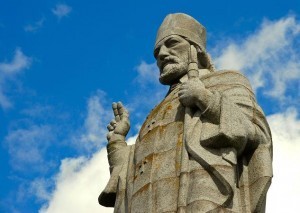
St. Patrick was born around 387 C.E. in Scotland, and turned to God once he was kidnapped by slave traders and brought to Ireland to be a shepherd.
“The love of God and his fear grew in me more and more, as did the faith, and my soul was rosed, so that, in a single day, I have said as many as a hundred prayers and in the night, nearly the same,” he wrote, according to Catholic Online. “I prayed in the woods and on the mountain, even before dawn. I felt no hurt from the snow or ice or rain.”
He joined the priesthood after his escape at the age of twenty, and eventually became a bishop. Patrick was tasked with the mission of bringing Christianity to Ireland, where he was enormously successful in converting much of the mainly Druid and pagan population.
History
St. Patrick’s Day originated as a Roman Catholic holiday recognizing St. Patrick, and was brought to America by Irish immigrants as a way of affirming their identity. It’s since been adopted by Americans of all backgrounds.
Traditions
Some Catholics celebrate St. Patrick’s feast day by going to mass, while other observers of the holiday wear orange and green and eat cabbage and corned beef. Lots of beer drinking may also be involved, particularly Guinness. St. Patrick’s Day parades are commonly held in many cities.
Symbols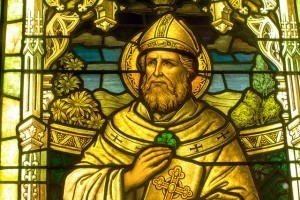
The shamrock is associated with St. Patrick, as he reportedly used the three-leafed plant as a way of explaining the Trinity- Father, Son, and Holy Spirit.
March 13, 2014
How to Turn Your Life Around: Esther’s Example
Sarah Coleman (Crosswalk)
 This is the Great Reversal: many of the first ending up last, and the last first (Matthew 19:30).
This is the Great Reversal: many of the first ending up last, and the last first (Matthew 19:30).
There are many great reversals in Scripture: Joseph, Paul, the famine in Samaria, to name a few. But there is none so celebrated as the story of Esther. A story of God’s saving power and grace. More than a tale of redemption or survival, it tells of hope and turnaround.
If so far your year looks grim, be encouraged. Now is the time of turnaround. God has been working behind the scenes. You are not forgotten. He is shifting things in your favour. Hold on. Persevere. He is turning everything into good.
The Jewish people celebrate the miraculous turnaround that occurred in the book of Esther each year. In 2014, festivities begin the evening of March 15. If you need a miracle, if you need your situation to turn around, why not rejoice with the Jewish people this year? Hallelujah! Your appointed time of turnaround is near.
For those unacquainted with the story of Esther, here’s a quick run down:
The nation of Israel was taken captive by the Babylonians. This was due to rebellion, as prophesied. The current Persian king, Xerxes, needed a new wife. Esther was chosen out of thousands. An undercover Jew.
The king’s aid, Haman, had it in for the Jews, especially Mordecai, Esther’s uncle. Haman convinced the king to allow him to wipe the Jews off the planet. The date this would occur was chosen by lot (rolling dice).
When Mordecai heard the decree, he asked Esther to intervene. At first she refused, but later realised that saving her people was her destiny. She asked that the Jews to fast and pray with her for wisdom.
Esther approached the king and revealed Haman’s plot of wickedness. The king was horrified and wrote a new decree declaring that the Jews could kill anyone who tried to kill them. Haman was hung on the gallows he built for Mordecai. The Jewish people were saved.
You’ll get a better idea of everything that transpired if you read the book of Esther yourself.
Now, how does this miraculous turnaround apply in our lives today?
Hidden Hope
The book of Esther is full of hidden hope. It is the one book in the Bible that does not mention the name of God. Not even once. Yet the message of God’s grace and redemption permeates each word.
On the surface, it appears as though God is absent, that the children of Israel were being punished for their sin and rebellion. Haman cast lots to determine the day that mass genocide would occur. It seemed that the Jews’ fate was left to chance. Or was it?
The numbers that came up with the roll of the dice were 1-3-3. This number spells the name Agag – King Agag. Haman was a descendant of king Agag. Agag was the king that Saul rebelliously did not kill in battle, eventhough God told him to. The spiritual connotations of King Agag include rebellion, witchcraft, and confusion.
Agag torments the mind. If your mind has been tormented lately, you are not alone. It may seem that confusion and rebellion have been winning. But what of the flip side?
If 1-3-3 is on the upside, the other side of the dice is 6-4-4. This number represents King David. A man after God’s heart. Giant killer. Great warrior.
The hidden hope of turnaround. In the natural, all was lost, but turnaround told a different story. There is hidden hope in your situation, too. Goliath is slain. Confusion is gone. Victory has come.
And we know that God causes everything to work together for the good of those who love God and are called according to his purpose for them (Romans 8:28).
Sacrifice for Wisdom
The catalyst for turnaround was humility and prayer. The people humbled themselves before God by fasting. When they did, wisdom came. Esther’s uncle, Mordecai, was the brunt of lies and gossip. Yet with wisdom, Esther was able to reveal the truth.
The odds may be stacked against you. Humble yourself. Sacrifice something as you spend time with the Lord. He will reveal his ways. People may be saying nasty things about you. Don’t look for revenge. Ask the Lord for wisdom. You are on the verge of turnaround. Be strong. Your vindication will come.
If you need wisdom, ask our generous God, and he will give it to you. He will not rebuke you for asking (James 1:5).
Fight Back
When King Xerxes recognised that he decreed punishment on innocent people, he was too late. A king’s decree could not be reversed. So to correct the injustice, Xerxes declared that on the day chosen for their annihilation, the Jews could fight back.
In this way, he disarmed the spiritual rulers and authorities. He shamed them publicly by his victory over them on the cross (Colossians 2:15).
The devil has been tormenting you long enough. Fight back. He is the defeated foe. Jesus has triumphed over him. You have been equipped with the armour of God to oppose every spiritual attack. Don’t passively allow things to happen. Stand your ground and see turnaround take place in your situation.
God, we believe today is our turnaround day. Things might look bad, but we know you are working for us behind the scenes. We believe for a miracle. We believe for complete victory over our enemy, the devil. Where he has tormented us in the past, he can never torment us again. It is turnaround, and we celebrate You and Your victory in the presence of our enemy. We are fighting back and we are the winners.
Sarah Coleman is an Australian author and communicator. Her books include Single Christian Female and Make Yourself Amazing . She is passionate about the Kingdom of God. She also loves being a wife and mother to two boys. To read more of Sarah’s thoughts go to sarahcoleman.com.au.
Published with permission from Sarah Coleman.
March 11, 2014
Christian conference in Bethlehem: Purpose for peace or propaganda?
Israel Blasts Global Evangelical Event in Bethlehem as ‘Shameful’
Christ at the Checkpoint focuses on just peace in Israel-Palestine conflict.
Timothy C. Morgan (Christianity Today)
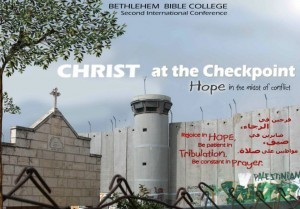 Israel has described a gathering of global evangelical leaders that opens today at Bethlehem Bible College as “unacceptable and shameful” for its intent to manipulate religious sentiment for political purposes.
Israel has described a gathering of global evangelical leaders that opens today at Bethlehem Bible College as “unacceptable and shameful” for its intent to manipulate religious sentiment for political purposes.
The Ministry of Foreign Affairs statement, issued to Israel Today—an Israel-based news agency with a mostly Christian readership and pro-Israel stance—was critical of the Christ at the Checkpoint conference, which runs from March 10-14 (livestreamed here) and is now in its third year.
The Sunday [March 9] statement reads:
The attempt to use religious motifs in order to mobilize political propaganda and agitate the feelings of the faithful through the manipulation of religion and politics is an unacceptable and shameful act. Using religion for the purpose of incitement in the service of political interests stains the person who does it with a stain of indelible infamy…
..One speaker, Gary M. Burge, professor of New Testament at Wheaton College, told CT by email today from Bethlehem, “The statement by the MFA concerning the checkpoint conference is tragic on so many levels: it is ill-informed — “political propaganda” is an absurd comment — and the statement itself is an incitement. This is simply the only gathering of Palestinian Christians in the world who are trying to have their voices heard by their brothers and sisters in Christ. I’m at the event. It is packed. And it is a moving testimony to these Christians’ faithfulness to Christ amidst dreadful circumstances. Israeli bureaucrats simply want those voices silenced.
“I think that the Israeli government is worried about this gathering because every year evangelicals are growing in their understanding of this conflict and questioning the standard Israeli narrative of things…” (read full story at Christianity Today)
March 10, 2014
The Crimean Peninsula and The Last Crusade
The 160-Year Christian History Behind What’s Happening in Ukraine
How we have misunderstood Russia, the Crimean Peninsula, and supposedly secular Europe.
Philip Jenkins (Christianity Today)
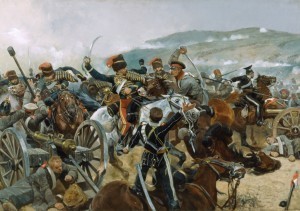
The Relief of the Light Brigade, 25 October 1854
In recent days, the Crimean peninsula has been at the heart of what some have described as the greatest international crisis of the 21st century. But this is not the first time the region has been so critical to international affairs. Many educated people have at least heard of the great struggle known as the Crimean War (1853-56), although its causes and events remain mysterious to most non-specialists.
If the conflict is remembered today, it resonates through the heroic charitable efforts of Florence Nightingale and the foundation of modern nursing. Actually, that earlier war deserves to be far better known as a pivotal moment in European religious affairs. Without knowing that religious element, moreover—without a sense of its Christian background—we will miss major themes in modern global affairs, in the Middle East and beyond.
Given its date, that religious emphasis may seem wildly anachronistic. This was, after all, a highly modern struggle between the Great Powers of the day: Britain, France, and the Ottoman Empire against Tsarist Russia. The war was fought with highly modern technology, including railroads and telegraphs, not to mention deadly artillery. Some 800,000 died, almost half from disease—at least as many fatalities as in the American Civil War of the next decade.
Yet the war’s causes seem to belong to a strictly pre-modern era, and Orlando Figes’ excellent recent history calls this The Last Crusade. As in medieval times, the war grew out of the situation of Christians under Muslim rule in the Middle East, and specifically the control of Jerusalem’s holy places…(continue reading at Christianity Today)
March 6, 2014
Formula for a false religion
The Pattern of All False Religions

image via darrellcreswell.wordpress.com
As the story goes, he was in a cave when suddenly the angel Gabriel appeared to him. The angel then supposedly pinned him to a wall and commanded him to “Recite!”
From that alleged episode was born the prophet of Islam (Muhammad), the Koran (which means the “recitation”), the god Allah, a rendition of Jesus that somewhat matches His portrayal in the Bible, and a method of salvation based on weights and measures (i.e. works).
Pick whatever non-Christian religion you’d like and you will see the same pattern emerge. You will witness:
A particular individual who eventually proclaims him/herself to be a prophet…
Who creates or ‘discovers’ a particular authoritative set of writings based on visions or encounters with a supposed angelic messenger or deity…
Who then uses those experiences and writings to proclaim (1) a false god; (2) a false savior; and (3) a false salvation.
With this well-worn path, the lives and souls of countless people have been destroyed. Let’s take a look at some concrete examples to get a better idea of how the process works.
A False prophet
Joseph Smith, the founder of Mormonism, claimed that in 1820 he received a special vision of the Father and the Son who instructed him not to join any modern church; all were abominations in their sight. Three years later, another messenger (Moroni) allegedly appeared to Joseph to inform him of a special book that was inscribed on gold plates, which supposedly contained the everlasting gospel. Seven years after that, Smith founded the Mormon church and claimed to receive another vision from God that he was to be “a seer, a translator, a prophet, and an apostle.”
Smith certainly isn’t alone in his claims of seeing visions and being crowned a prophet. Investigate the lives and assertions of Charles Taze Russell from the Jehovah’s witnesses, Muhammad, Buddha, Sun Myung Moon, or L. Ron Hubbard and you will see the same things.
A False authority… (continue reading at the Christian Post)
March 4, 2014
Boldly speaking the Gospel—naked?
Pro Football Was My God
Until a half-naked man showed up at my locker.
Derwin Gray (Christianity Today)
 Growing up on the west side of San Antonio, I believed in god—the god of football. The game was my ticket out of an early life saturated with violence, addiction, abuse, and chaos.
Growing up on the west side of San Antonio, I believed in god—the god of football. The game was my ticket out of an early life saturated with violence, addiction, abuse, and chaos.
I was raised by my grandmother, because my parents were only teenagers when I was born. They were children bringing a child into the world. As much as they wanted to care for me, the hurt and brokenness in their lives prevented them. “Grannie” was a Jehovah’s Witness, so that was the religion I knew. After a while, even that went away.
We were not poor. We were “po.” We couldn’t afford the other o and r. We didn’t eat meals together. We didn’t pray together. There were good times, like when we’d go fishing or when my grandfather would come home after work in the evenings. By the time I was 13, however, I looked at my environment and told my grandmother, “I’m going to do something with my life.”
Football was my way out of the hell I was living in. I believed it would lift me into the heaven of the American dream.
Football functioned as my savior. It gave me love: If I played well, I was loved by fans. It gave me an identity: I was Derwin, the football player. It gave me significance: I was somebody because I was a great player. And football gave me a mission. My mission was this: Derwin, you can go to college and make something of your life..
…On April 25, 1993, I was drafted by the Indianapolis Colts to strong safety. I had made it!
Then I met the Naked Preacher, a linebacker for the Colts in 1993.
It was impossible not to notice a linebacker who would take a shower, dry off, wrap a towel around his waist, pick up his Bible, and ask those of us in the locker room, “Do you know Jesus?” I would think, Do you know you are half-naked?
I asked the veterans on the team about him. They said, “Don’t pay attention to him. That’s the Naked Preacher.”
At this point in my life, I did not want anything to do with Jesus or a half-naked man talking about him, so I tried to avoid him. One day after practice, I was sitting at my locker and saw the Naked Preacher (whose real name is Steve Grant) walking toward me.
“Rookie D. Gray, do you know Jesus?” he asked.
I pretended to not hear him and turned my back. He repeated the question, but this time he was at my locker. Even though I was not a churchgoer or involved in any religious group, I gave what I thought was a very religious answer: “I’m a good person.”
I explained to Steve that I was one of the only men in my family who had not been to jail, who did not have a substance abuse problem, who had graduated from high school and college, and who did not have a child outside of marriage.
The Naked Preacher opened up his Bible and shared two verses with me: “And Jesus said to him, ‘Why do you call me good? No one is good except God alone’” (Mark 10:18, ESV); and, “For all have sinned and fall short of the glory of God” (Rom. 3:23).
Steve explained that according to the Bible, only God is good; he is the standard of goodness and righteousness. Everyone else has sinned and falls short. This disturbed me… (continue reading at Christianity Today)
Derwin Gray is the author of Limitless Life: You Are More Than Your Past When God Holds Your Future (Thomas Nelson). Get the first chapter free at LimitlessLifeBook.com.

